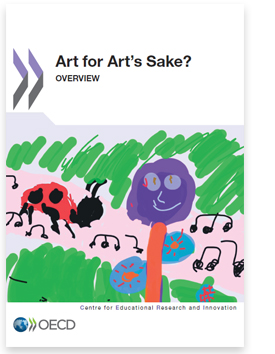Arts education is often said to be a means of developing critical and creative thinking. Arts education has also been argued to enhance performance in non-arts academic subjects such as mathematics, science, reading and writing, and to strengthen students’ academic motivation, self-confidence, and ability to communicate and co-operate effectively. Arts education thus seems to have a positive impact on the three subsets of skills that we define as "skills for innovation": subject-based skills, including in non-arts subjects; skills in thinking and creativity; and behavioural and social skills.
This report examines the state of empirical knowledge about the impact of arts education on these kinds of outcomes. The kinds of arts education examined include arts classes in school (classes in music, visual arts, theatre, and dance), arts-integrated classes (where the arts are taught as a support for an academic subject), and arts study undertaken outside of school (e.g. private music lessons; out-of-school classes in theatre, visual arts, and dance). The report does not deal with education about the arts or cultural education, which may be included in all kinds of subjects.
The impact of arts education on other non-arts skills and on innovation in the labour market should not be the primary justification for arts education in today’s curricula. The arts have been in existence since the earliest humans, are parts of all cultures, and are a major domain of human experience, just like science, technology, mathematics, and humanities. The arts are important in their own rights for education. Students who gain mastery in an art form may discover their life’s work or their life’s passion. But for all children, the arts allow a different way of understanding than the sciences. Because they are an arena without right and wrong answers, they free students to explore and experiment. They are also a place to introspect and find personal meaning.
Artists, alongside scientists and entrepreneurs, are role models for innovation in our societies. Not surprisingly, arts education is commonly said to be a means of developing skills considered as critical for innovation: critical and creative thinking, motivation, self-confidence, and ability to communicate and cooperate effectively, but also skills in non-arts academic subjects such as mathematics, science, reading and writing. Does arts education really have a positive impact on the three subsets of skills that we define as “skills for innovation”: technical skills, skills in thinking and creativity, and character (behavioural and social skills)?
The report answers this question by updating and extending to behavioural and social skills the meta-analyses published in 2000 by the “Reviewing Education and the Arts Project” (REAP) directed by Hetland and Winner. Meta-analyses combine existing studies on a specific topic to assess whether a finding is consistent and has enough statistical power to be generalised. In addition to studies already reviewed in the REAP project, this new enquiry involves the systematic investigation of research databases in education and psychology in the following languages: Dutch, English, Finnish, French, German, Italian, Japanese, Korean, Portuguese, Spanish and Swedish.


Most Commented